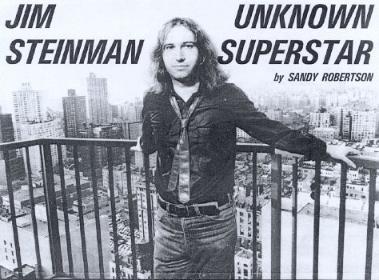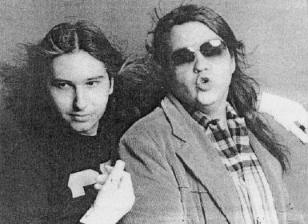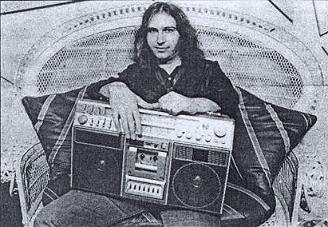Jim Steinman - Unknown Superstar
By Sandy Robertson
Sounds Magazine
1981

As I scan this week's album chart I find Meat Loaf's 'Bat Out Of Hell' at number 36, roughly the sort of lofty position it's kept a grip on for an uncanny three years or so. On the other hand, the debut LP by a bloke called Steinman is nowhere to be seen. The difference between the two is undoubtedly the reason I'm sweating in room 906 of the New York Holiday Inn, while a brace of undercooked eggs cool on the table; publicity, identification, image. Selling uniqueness to you.
Meat Loaf's wonderfully overwrought blend of vocal histrionics, rock cliché, extended metal noize, pop sensibility and visual vulgarity owed most of it's seemingly inexplicable success to its composer, Jim Steinman, an obsessive genius whose talent has been all but overlooked in the rush to babble about Mr. Loaf's waistline.
Every song on the 'Bat' album has been released as a single, from pained torch tunes to intricate, operatic, rock structures, all with a fair degree of success.
With between six and eight million albums sold worldwide (depending on who you believe) Steinman, while remaining one of those guys nobody one talks to seems to have heard of, appears to have found the elusive formula for pleasing all of the people much of the time. Except the depressed studio engineer, who listening to a new song called 'Left In The Dark' tried to slit his wrists. That's power!
(This incident, I just discovered, was predicted by Meat Loaf to me in Sounds 18 months ago, the Loaf assuring me this would happen if Steinman ever did the song!!)
Our hero now lives in uptown Manhattan in Gene Simmons' old apartment, the Kiss fella having left his pinball machine behind in favor of Diana Ross. Steinman has graying hair and dresses casually, every inch the bohemian artist. His only additions to the flat look like a stack of classical tapes and a book on Wagner. It figures.
And yet the over-the-top HM Demis Roussos aspect of Meat Loaf, the Wagnerian style, can't have been an easy concept to sell. People think of it as crass now, but that's just smug hindsight, surely?
"I think it was turned down by 18 record companies and 10 to 12 producers," says Steinman. "We didn't have a demo tape, we just had me at the piano and Meat singing. I remember we auditioned for Clive Davis at Arista in a tiny office. There I am pounding away at the piano with my hands bleeding and Meat sweating like a maniac! No one could deal with it, they couldn't figure out what it would sound like when it was finished."
But Steinman, crucially underrated, could hear it in his head.

"The producers were scared of it, they didn't know how to translate it, especially the theatrics. We'd do 'Paradise By The Dashboard Light' in this little office, with Ellen Foley and Meat Loaf French kissing and slapping each other around! Bob Ezrin was my first choice," says Steinman a little regretfully. "I couldn't even get his phone number. Glyn Johns was on the list, George Martin...Finally, we got Todd Rundgren, who was great. He even put up some of his own money."
The tortuous negotiations that led up to the 'Bat' LP ending up on Epic have been well documented in these pages. But no one ever quite explained why there's never been a follow-up album, nearly four years on. Rumors of ego death and crackups abound, while Steinman's 'Bad For Good' album contains many songs that were previously alleged to be part and parcel of the embryonic successor to 'Bat'. What gives?
"What happened was he abused his voice on the road...Technically he has a lot more in common with an opera singer, enormous lung-power, and people with voices like that usually don't sing extended tours. At the end, his voice was pretty much shot. It was partly a physical problem but it became psychological, because it freaked him out that his voice wasn't there. I think the voice is a pretty mysterious thing anyway.
"We started in Woodstock doing this album, which started out to be his, and he tried singing some of the tracks right there at the piano, and the sounds that were coming out were really inhuman. At the time I described it as sounding like in 'The Exorcist', horrible sounds coming out! We worked for months...Actually, I thought he showed an awful lot of guts at the time because there was a lot of pressure from the record company to just put anything out."
Meat Loaf went off to work on the 'Roadie' movie while Steinman set about coming up with another whole new LP worth of songs for him, but he still had vocal problems upon his return.
From here on things got weird: "Finally, Jon Landau, Bruce Springsteen's manager, suggested this guy in California who had worked with Jackson Browne and Bonnie Raitt. He's not a doctor of any kind, he's sort of like a witch doctor. The guy's treatment is, he injects you with your own urine and then he beats the shit out of you! He had Black and Decker power tools, huge saws, axs...He puts rubber pads on your body and he pounds for like three hours, and you scream. I can't imagine Jackson Browne going through this! He never wants to hear any singing, he just wants him to yell while he's being beaten up.
"This went on for like three months and the difference is amazing. God knows why it works, but his voice has improved 1,000% because of it."
Whatever you think of that story, kids, an all-new Meat Loaf platter should finally be winging its way to you late summertime. Steinman's 'Bad For Good' is very much in the epic fantasy vein of 'Bat'. Will Meat's album be similar, or has consumption of his own pee-pee changed our hero's vinyl manners?
"Meat's album is different. This one I was consciously setting out to see if I could take the elements that were in 'Bat Out Of Hell' as fast as they could go. It was meant to be real mythic, very cinematic, really full of visual imagery."

This album is a little more intimate, the lyrics are more personal. It's had like three different titles in the last week. One of the songs is called 'Dead Ringer', and that might be the title. The title I wanted to use was considered too strong, which was 'I'll Kill You If You Don't Come Back,' one of the best love songs I ever wrote, great chorus line: 'In every way I want you out of my life/ But I'll kill you if you don't come back.'
"Then there's a nice song there called 'Everything Is Permitted'...'Everything is permitted/ Nothing ever is taboo/ And there is always something shattered/ When there is something breaking through.' Meat wanted to use this title for a while, but I asked him not to because it's a Dostoevsky line." Who else (but Jim Carroll, Iggy and Burroughs would have the nerve to copy ol'Feydor?). A select crew.
"Meat's album is more like a normal album than mine. Originally, it was like the story of one crime of passion that had been committed. I was gonna have narration all the way through it kinda like 'Dragnet', telling the exact time of day when each song took place, all leading up to this crime. But it got a little too ambitious. I decided it was imposing too much on the songs, so it might just have a touch of that," Steinman grins.
The idea of narration and speeches as part of the recorded concept is a Steinman trademark, heard to best advantage on the poem 'Love And Death And An American Guitar', a Jim Morrison-type rant to end them all which is featured on 'Bad For Good.'
"That's my favorite cut next to the title cut. I love the Doors, they were my favorite group from like '68 to '72. No one's doing that now. The only thing is that Morrison wasn't all that funny, it was pretty solemn stuff! So I wanted to do one that'd be funny as well as have that hallucinatory quality.
"See, a lot of these songs, I write a song thinking about a movie or a play. It's hard for me to write unless I can visualize it in a film or on a stage. So I'll just make up a whole movie and write the song for that."
The aforesaid, 'Left In The Dark' was for "a teenage 'Othello'..." he says.
"About four of the songs on this I wrote for something I've been thinking about for two years called 'Neverland', which is like a rock and roll Peter Pan set in the future."
Readers will recall this as the much-discussed flick set to include Meat Loaf as 'Tinkerbelle, the fairy. Will such an insane project ever get outside Jim's cranium and onto celluloid?
"Yes. CBS films just put up a lot of money for me to write the script...It would be a real expensive movie, because it would need all the special effects that a 'Star Wars' would have...but you can never guarantee a movie's gonna get made 'til it does."
Potential directors?
"There are only like four or five directors I think who could do it. My first choice is Francis Ford Coppola, him or George Lucas or Steven Spielberg. Actually, I'd like Brian DePalma...but I'm friends with him and I know he doesn't like to discuss projects at dinner, so I don't like to mention it. The thing is, he's really scared of doing a musical, I think he's a really musical director anyway. And he loves rock 'n' roll."
DePalma, masterly director of 'Carrie' and the vastly underrated 'The Fury' has also worked with the sadly deceased film composer Bernard Herrmann, who is another Steinman hero. Indeed, the orchestral 'Storm' EP track included with 'Bad For Good' is a Herrmannesque exercise of great dexterity.
"That was one I wrote for 'Neverland', it's the opening sequence when Peter and The Lost Boys are setting out to kidnap Wendy. It's a big blizzard sequence, soldiers guarding her in this evil metropolis...I also wrote it because I was really into the idea of what Stravinsky would do if he put out singles, if classical composers had to do singles what they would do. It's a classical piece, but it's one of the shortest things I've ever written..."
The musos loved it, Steinman being far superior to the 'rock/classicist' average.
"Plus I wanted to do this thing where the orchestra would be like Led Zeppelin uses their instruments, just bashing away...Amazingly enough that piece is arranged for a band, kind of like a mixture of Led Zeppelin and Frank Zappa. Todd said it was like a cross between Wagner, Led Zeppelin and a traffic jam! We had to splice it together from 40 different attempts. They do too many drugs, The New York Philharmonic, that's the problem!"
Steinman originally signed to Robert Stigwood upon leaving High School, only to be told that the whole deal was a tax shelter and that he wouldn't get to record for two years. He could, of course, write for such great talents of our times as Yvonne Elliman. No thanks, he said, and returned to theater and, where he met Meat. ("It was really good timing, because I had been in this big fight and had my nose badly broken by this 6'2" lady biker with a tattoo! Afterwards I couldn't even talk very well for a year and a half; so Meat came along and I though: 'This guy is my voice'...)
"I only got into rock 'n' roll in college because I was doing this play and one night I thought, I wouldn't wanna see a play if it didn't have any music. I'm about 20 years old and I start writing music. And I auditioned for all these bands...There was this good band that I auditioned for. I'd learned all 'The Doors' album off by heart and somehow manipulated them into letting me play that, so they were really impressed...But I couldn't even play the blues!
"My two trademarks with all the bands I was in were my little notebook with all the chords written out and my hands bleeding over the keys. I had a little electric organ that I'd bash the shit out of, then hold my bleeding hands up at the end of the set. It seemed to me a very musical thing to do."
Absolutely so!
Steinman grew up in a house full of records.
"I used to listen all the time to rock 'n' roll and classical. It never occurred to me that there was much difference."
The turning point for the 12 year old Jim came after a 21 hour session with 'The Ring Of The Nibelungen' was followed by a blast of Jerry Lee Lewis.
"It just went, Wow! These things go together!"
Hence the gloriously mutated excess of his concepts. Don't it always stem from childhood?
The ultimate test of Steinman's uniquely perverse but perfectly logical heavy music hybrids will be the success or failure of 'Bad For Good' sans the Meat Loaf voice and huge visual aspect. Loaf star sidekick vocalist Ellen Foley almost cut the cake on her first platter, but blew it badly on the Clash-mashed follow-up. Jim actually likes the record 'The Spirit Of St. Louis', but is somewhat scornful of Ellen's partnership with Mick Jones.
"There's a song of mine called 'Heaven Can Wait' from 'Bat Out Of Hell' which she really does magnificently. She really wanted to record it and Mick wouldn't let her. He's got a real phobia about me or something!
"It's strange, because I never said anything about the guy. Ellen and I thought he did a great job, I gave her all this bullshit and everything, but he won't listen, he won't let her do anything except his songs or songs he picked out. The record company said, we don't like this record, no one's gonna play it."
Right. Ah well, pleasure should never interfere with business. There's not one song on 'Spirit' with the emotional density of 'Heaven Can Wait'. Too bad it's 'Bad' and not 'Spirit' that rings with greatness.
Steinman goes further than me, folks. As regards Mick: "The thing that bothers me most about what Ellen tells me is there seems to be no sense of humor there… He really seems to believe he's this major political force. It's amazingly naive. It seems to me the first requirement of someone who's gonna write anthems for the working classes is to write a good tune, y'know?"
"Someone asked me the other week about politics and rock 'n' roll, and I said I thought this ('Bad For Good') was a much more political album than The Clash. To me, all good rock 'n' roll is I think by definition political. Like Chuck Berry's political if you take it in the sense that rock 'n' roll at its best always is breaking down barriers, going past limits. I think every song on this album is a call to action, a cry against passivity..."
Agreed, maestro.
"I've always felt The Clash'll never be as political as Chuck Berry or Elvis, 'cause they'll never reach that many people. If music can make a pulse go faster, make a heartbeat stronger, that's in a way a political act. In a world full of cripples, the only pure revolutionary act is to get up and dance!"